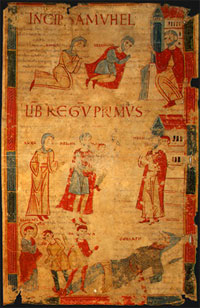Samuel and the Silence of God:
So You Wish to Hear a Word?
For Sunday January 15, 2006
Lectionary Readings (Revised Common Lectionary, Year B)
1 Samuel 3:1–10 (11–20)
Psalm 139:1–6, 13–18
1 Corinthians 6:12–20
John 1:43–51
 |
Four Scenes from the First Book of Samuel, late 11th century, miniature on vellum |
Over the holidays I watched a television special on the Discovery Channel commemorating the first anniversary of the earthquake and tsunami that left 231,000 people dead or missing in southeast Asia (December 26, 2004). Even a year later it was surreal to watch home videos of rampaging rivers of debris sweep cars, trees, boats, refrigerators and even entire houses through the main streets of villages. The program interviewed several survivors, one of whom was a boy about 12 years old. When asked to explain how such a tragedy could happen, he remarked, "We have left our traditional ways, and so God was angry with us. He abandoned us. I think I am alive today to tell our people this."
That Indonesian boy was engaging in a bit of theologizing that is quite common is Scripture. In any number of places the Bible describes God as forgetful, ignorant, remote, furious, and even asleep (cf. Psalm 44:23). In the Old Testament reading this week God is portrayed as speechless, as if He were unable or unwilling to talk: "in those days the word of the Lord was rare; there were not many visions." We generally do not interpret such descriptions of God in a literal way, nor should we. We explain these unflattering depictions of God as "anthropomorphisms," that is, paltry human attempts to describe Him who is ultimately beyond description, and to articulate the common experience so poignantly expressed by that little boy—the loneliness of abandonment in a silent world.
 |
God calls Samuel, anonymous, Utrecht, c. 1430. |
We can confidently say that Indonesia is no more wicked or deserving of divine punishment than any other country, and in the New Testament Jesus discouraged linking human misfortune with divine punishment (John 9:1–3). But that little boy was on to something, I think. He was right to describe divine activity as mysteriously intertwined with human choices, to picture human history as a dynamic synergism between God's call and humanity's response. History is not mechanistic, and still less is it meaningless; it is the interplay between the free decisions of people and the sovereign love of God.
 |
God calls Samuel, French, c. 1250. |
That is how I understand Samuel's assessment. The silence of God and the absence of visions he described were not just a subjective feeling, a poetic anthropomorphism, or a human projection onto their image of God. Rather, Samuel accurately described an objective state of affairs. That time was, after all, a period of political anarchy in Israel's history when "every person did what was right in his own eyes" (Judges 17:6 = 21:25), when the two sons of the priest Eli, Hophni and Phinehas, were "wicked men; they had no regard for the Lord" (1 Samuel 2:12). People were not listening. God was not speaking. He was silent. Visions were rare. Having left their traditional ways, as the Indonesian survivor put it, God was angry with his people Israel.
It is a chilling thought to realize that God might grant humanity's request for autonomy, that He could honor our insistence that He leave us alone, or that He would stop speaking as a consequence of our not listening. Perhaps His last terrifying word to us might be, "I have answered your prayers and now grant you the horrible freedom you have craved. Since you are so disinterested as to not listen, I will no longer speak, so from now on the only voices you will hear will be your own."
 |
Samuel anoints Saul as King, Maciejowski Bible (13th century illuminated manuscript). |
But a single person can make a difference. Samuel proved to be the exception in this story. Dedicated to the Lord by his mother Hannah at an early age, he "continued to grow in stature and in favor with the Lord and with men." In contrast to the silence that had fallen upon the land, God spoke to him three times as a little boy (Jewish tradition says he was 12 at the time), and he responded with his famous words, "Speak, Lord, for your servant is listening." In contrast to the priest Eli and his two degenerate sons who flaunted their serial sexploitations in the place of worship (1 Samuel 2:22), "the Lord was with Samuel as he grew up, and He let none of his words fall to the ground." The nation recognized him as a prophet who heard from and spoke for Yahweh. Eventually Samuel would crown Israel's first king, Saul, but not before warning the nation about the oppression inherent in political power (1 Samuel 8). By himself Samuel ended the drought of divine silence in Israel, for "Samuel's words came to all Israel" (1 Samuel 3:19, 21).
The story of Samuel and the silence of God reminds me of a "saying" from the early desert fathers in Egypt that emphasizes this decisive link between divine speech and human attentiveness, between His call and our response, between word and obedience. Like so many of the desert "sayings," this story from Abba Felix begins in one place but ends in another.
"Some brothers who had some seculars with them went to see Abba Felix and they begged him to say a word to them. But the old man kept silence. After they had asked for a long time he said to them, 'You wish to hear a word?' They said, 'Yes, abba.' Then the old man said to them, 'There are no more words nowadays. When the brothers used to consult the old men and when they did what was said to them, God showed them how to speak. But now, since they ask without doing that which they hear, God has withdrawn the grace of the word from the old men and they do not find anything to say, because there are no longer any who carry their words out.' Hearing this, the brothers groaned, saying, 'Pray for us, abba.'"
Perhaps the Indonesian boy spoke more than he knew. If there are "no more words nowadays" from God, if He has "withdrawn the grace of His word," that might have more to do with human refusal to listen rather than with divine reluctance to speak.
For further reflection:
* When and why have you ever felt the silence of God?
* Do you think we can assign a "cause" for the Indonesian tsunami, other than a scientific explanation? What about Katrina, or the Iraq war?
* What are the dangers of claiming that God has spoken to you?
* Is God speaking today? Where and how?





